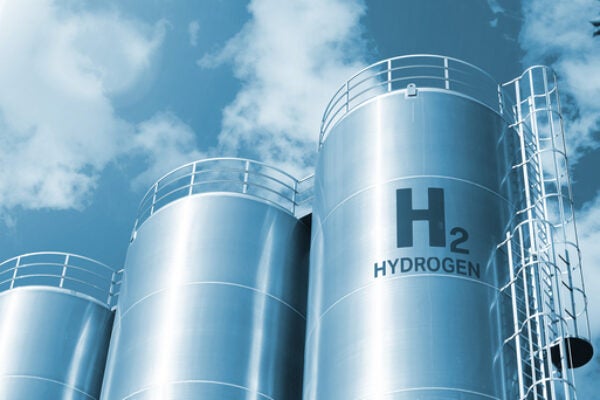AUSTIN, Texas — The University of Texas at Austin joined top energy companies in issuing a report to the Texas Legislature advising the steps it could take to advance the state’s growing hydrogen industry. The report, issued by the Texas Hydrogen Production Policy (TxH2) Council, provided several key recommendations focusing on safety, environmental protection, and regulatory clarity and efficiency. UT is the only university represented on the council.
“The work carried out by my colleagues and I on the committee will significantly advance the growth of the hydrogen sector in Texas so that we can maintain our unparalleled role as a global leader in all forms of energy production,” said Professor Brian A. Korgel, Ph.D., director of the UT Energy Institute, who serves as one of the 11 members of the council. “It is an honor to contribute to the important work of the Texas Hydrogen Production Policy Council as we seek to ensure that the potential of hydrogen is fully tapped to bring greater economic opportunities and maintain reliable energy supply across Texas.”
The full report “Hydrogen Energy Development in Texas” is available online.
Via UT’s Energy Institute, Bureau of Economic Geology and Center for Electromechanics, among numerous other programs, the University is poised to take a leading role in providing the research and guidance required to implement the recommendations made by the council.
One central recommendation of the report is for development of training and education programs to improve public awareness of hydrogen, increase public acceptance of hydrogen, and enhance safety. UT is uniquely equipped to play a leading role in such programs due to its broad expertise in hydrogen, as well as other sectors and existing programs integral to the broader hydrogen industry, including geothermal, nuclear and solar initiatives in addition to UT’s HyVelocity Hub and H2@Scale demonstration project.
The 10 recommendations made to lawmakers in the TxH2 Council’s report state that:
- Texas should maintain the current framework of regulatory oversight, with targeted clarifications and improvements.
- Rulemaking should address hydrogen infrastructure, such as pipeline and casing materials, separately from infrastructure used for other products when the distinction is technically merited based on hydrogen’s unique physical properties.
- Texas should identify hydrogen-focused individuals at relevant state agencies to improve the effectiveness and efficiency of oversight in hydrogen applications.
- Encourage training and education programs to improve public awareness of hydrogen, which will increase public acceptance of hydrogen and enhance safety.
- Texas should continue streamlining and standardizing its permitting processes.
- Texas should continue to support its efforts to ensure a low-cost, reliable supply of natural gas and electricity, which are foundational to all forms of hydrogen production and to the industries creating hydrogen demand.
- To promote the growth of clean hydrogen production derived from natural gas, Texas should prioritize the development of carbon dioxide management infrastructure, including pipelines and underground storage, as well as expand the supply of lower emission natural gas, such as responsibly sourced gas (RSG) and renewable natural gas (RNG).
- To support the expansion of clean hydrogen production through electrolysis, Texas should adopt an “all of the above” energy approach, encouraging the expansion of low carbon electricity production from existing sources (wind and solar) and emerging ones (nuclear and geothermal).
- Texas should encourage significant expansion of infrastructure supporting the entire hydrogen value chain. Wherever possible, this expansion should leverage existing infrastructure to minimize costs and environmental impact.
- Texas’ state policy to support the hydrogen industry should be designed to maximize economic benefits for its people while minimizing costs for taxpayers.
Texas’ hydrogen industry has long been well established, traditionally serving the petrochemical and refining industries. In recent years, more opportunities have emerged for its use, especially to enhance manufacturing and electricity generation.
In 2023, the TxH2 Council was established by the Texas Legislature to be chaired by Railroad Commission Chairman Christi Craddick and tasked with making recommendations to lawmakers on updates necessary for the oversight and regulation of production, pipeline transportation, and storage of hydrogen. The council is planned to continue until Jan. 1, 2030, and the recommendations in the report are expected to be reviewed and modified as technologies, markets and hydrogen regulations evolve.
The Texas Hydrogen Production Policy Council members are:
- Texas Railroad Commission Chairman Christi Craddick
- Brian A. Korgel, The University of Texas at Austin
- Richard Fenza, Air Liquide
- Preston Kurtz, Air Products
- Nigel Jenvey, Baker Hughes
- Keith Wall, CenterPoint Energy
- Ian Lindsay, Chevron New Energies
- Angie Murray, Enterprise Products
- Brian Weeks, GTI Energy
- Jeffrey Pollack, Port of Corpus Christi Authority
- Kelsie Van Hoose, Williams Companies




